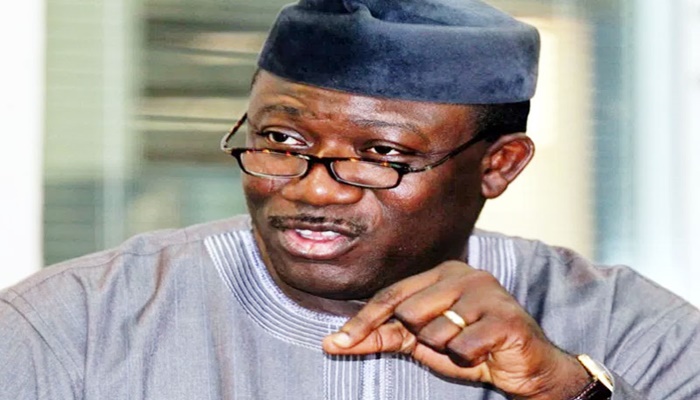
The Nigeria Governors’ Forum (NGF), on Monday, said that the consequential increments in the implementation of the N30,000 Minimum Wage Law would depend on the capacity of each state government.
The chairman of the forum and Governor of Ekiti State, Dr Kayode Fayemi, stated this while briefing newsmen at the end of the meeting of the forum held in Abuja.
Fayemi reading the meeting’s communique said that the forum made the resolution when it met and reviewed current progress in the implementation of the minimum wage law.
Clarifying on the forum’s position and Federal Economic Council (FEC)’s decision, Fayemi said that while state governors agreed to the N30, 000, FEC did not determine what happens in the states.
He said that each state had its State Executive Council, which is the highest decision making body at the state level.
“The forum as the representative body of the states keenly followed what happened in the negotiations that led to that template.
“As far as we are concerned, the best the forum can do is to stick with what has been agreed with the states. States are part of the tripartite negotiations.
“States agreed to that N30,000 minimum wage increase.
“States also know that there will be consequential adjustment but that will be determined by what happened on the state-by-state basic.
“Because there are different number of workers and different issues at the state level.
“Every state has its own trade union joint negotiating committee and they will undertake this discussion with their state governments.
“The day after this agreement was reached with labour, it was on record that I was on a national television and made the position of the governors clear.
“That for us this was a national minimum wage increase, not a general minimum wage review.
“Yes, that may necessitate consequential increment, we have no doubt about that but that is a matter for the states to discuss with their workers,’’ he said.
Fayemi also pledged the governors’ commitment to counterpart resources to strengthen mass vaccination campaigns against yellow fever at the states.
He commended the rapid response of the Nigeria Centre for Disease Control and the National Primary Health Care Development Agency to nip in the bud the August yellow fever outbreak in parts of the country.
“Members commended the progress made by state governments through their Social Health Insurance Authorities to enrol and provide health insurance cover for citizens across the country.
“In the last one year, state governments have registered over two million people compared to five million Nigerians registered under the National Health Insurance Scheme over the last 14 years,’’ he said.
Fayemi also expressed the forum’s tribute to Dr Stella Adedavoh, the physician who attended to `Patient 0’ during the Ebola Outbreak in 20I4 in Lagos State.
“Adedavoh died from Ebola virus on Oct. 21, 2014, but her memory lives on with the dream of `Healthcare for all Nigerians’’’, he said.
Fielding question on Gov. Nasir el-Rufai’s ad hoc committee on excess crude account and other special accounts, the governor said it was a committee of the National Economic Council.
He, however, said that the report would be submitted on Tuesday to the council.
On the N614 billion support to states by the federal government, Fayemi said the governors did not have any issues with the deduction, adding that “it has been deducted as far as I am aware, from state accounts.’’NAN






